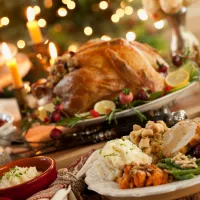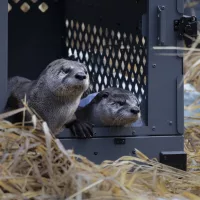
Deschutes County Environmental Health is encouraging cooks to keep food safety in mind as they prepare their holiday feasts this year.
Food poisoning outbreaks increase in November and December and are often linked to popular holiday foods, like turkey. Whether you’re cooking a whole turkey, or just part of the bird this holiday season, Environmental Health is offering tips on how to safely store, thaw, handle, cook and reheat your turkey to prevent food borne illnesses.
Proper turkey storage:
Environmental Health recommends storing frozen raw turkey in a freezer of 0 F or lower until it is ready to thaw.
“Frozen turkeys should never be stored in a car trunk, the back porch, in the snow, or any location where the temperature can’t be closely monitored,” said Deschutes County Environmental Health Supervisor, Adrea Albin.
Methods to thaw turkey safely:
As you thaw out your turkey, it is important to keep it at a safe temperature during thawing. Bacteria that may have been present on the raw meat before it was frozen can begin to grow again if not managed properly.
“Never thaw your holiday bird on the kitchen counter, said Albin. “We suggest using one of three methods to safely thaw a frozen turkey: in the refrigerator, in cold water, or in the microwave. Thawing times vary with each method depending on the size of the turkey.”
You can find more information about thawing turkeys here.
Correctly handling raw turkey:
It is also important to handle thawed turkey correctly to prevent the spread of harmful germs that may be on the raw meat or in its juice.
“Be sure to wash your hands with soap and water for at least 20 seconds before and after your handle raw turkey,” said Albin. “Never place other food on a surface that held raw meat. We suggest using a separate cutting board for your raw turkey, and be sure you thoroughly wash countertops, cutting boards, utensils and dishes after you prepare your turkey.”
Cooking turkey and stuffing thoroughly:
There are a variety of ways to cook a turkey, but no matter which method you chose, the meat must reach a minimum internal temperature of 165 F before it is safe to eat.
Environmental Health recommends using a food thermometer to measure a turkey’s internal temperature, inserting it into three parts of the turkey: the thickest part of the breast, the innermost part of thigh and the innermost part of the wing.
“If your turkey has pop-up timer, you should still use a food thermometer to ensure the bird is safely cooked,” said Albin.
If you’re making stuffing, Environmental Health recommends cooking it in a casserole dish rather than inside the turkey because it is easier to ensure that it is thoroughly cooked. Germs can survive in stuffing that has not reached 165 F, so you should check the temperature at the center of the stuffing with a food thermometer to make sure it is safe to eat.
Turkey cooking times vary, depending on the weight of the turkey and whether it is stuffed. You can find a timetable to help you determine how long to cook your bird here.
Safely keeping leftovers:
Leftovers must be handled with care as well. Be sure to refrigerate or freeze any leftovers within two hours of cooking. You don’t need to wait until the food has cooled to store it. Leftover turkey and the dishes made with it, like soup or casserole, should be consumed within three to four days or frozen for longer storage. Environmental Health recommends reheating all leftovers to at least 165 F before eating.
For more safety tips for preparing your holiday meals, you can download this infographic or visit foodsafety.gov. You can also listen to our Holiday Food Safety edition of the Inside Deschutes County podcast, which is available on the County website or on your favorite podcast platform.














